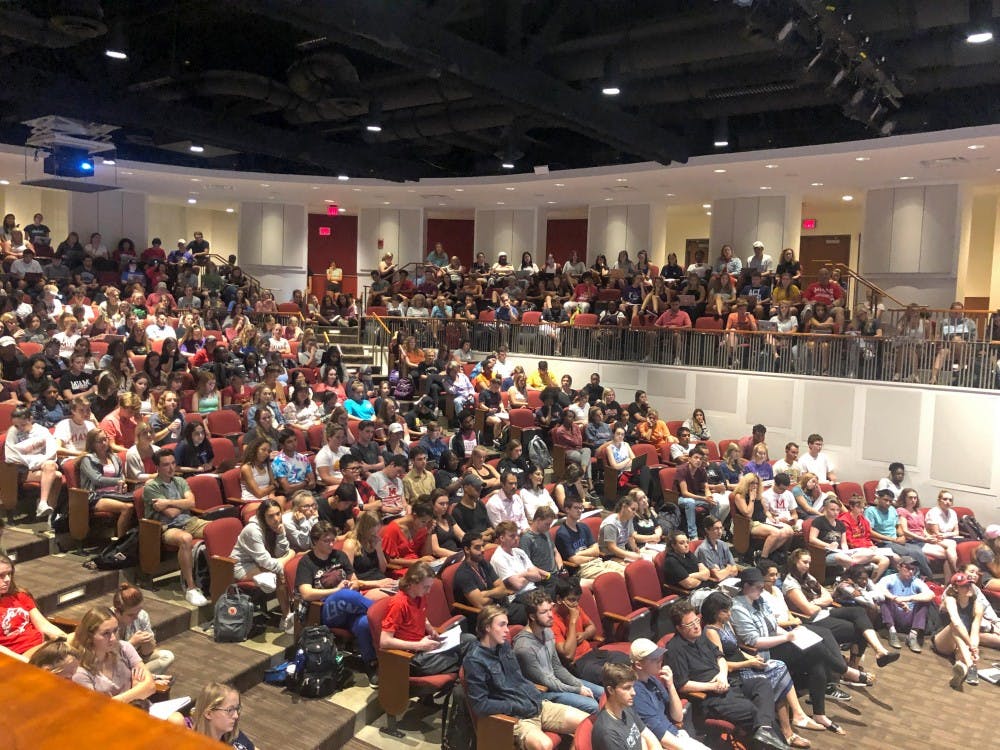Eight student panelists took to the Wilks Theater stage for the Racial Consciousness 101 Forum, an event for conversations regarding race and racial myths last week.
The forum was a revamped version of a 1981 anti-racism initiative aimed to “help educate the student body about the experiences of students of color on campus,” said doctoral candidate Kyle Larson, one of the forum’s lead organizers.
The first revamped forum took place last year in Wilks. But in the ’80s, students would go to classrooms for discussions.
“When [senior Clara Guerra] and I first started organizing this, I felt it to be a labor issue,” Larson said. “Instead of going to every classroom, you can come to us … and we can have an increased impact.”
Because of that “increased impact” and increased workload, panelists were compensated financially or with one to three independent study course credits for participation. The stipends were between $100-$300 each. The money came from fundraising done by the forum organizers and the students enrolled in independent study courses.
The organizers and panelists said they felt a need for a conversation about race to be held on a campus like Miami.
“Miami is Miami,” Larson said. “A lot of students here come from a very privileged background … I think this campus is like a ground zero for anti-racist work.”
Almost 71 percent of undergraduate students at Miami’s Oxford campus are white, according to the October 2018 statistics from the university’s diversity webpage.
The next largest racial group is Hispanic/Latino at 4.7 percent. Multi-Racial makes up 3.7 percent of the student body, Black/African American students have 3.4 and Asian students are 2.2 percent. All other groups were less than 1 percent.
The eight panelists came from diverse backgrounds, representing many racial demographics on campus.
In order of presentation, the panelists were Kara Strass, Austin Lamewona, Priyana Kalita, Taylor Dancer, Jannie Kamara, Nan Kanjanakullawat, Frida Rodriguez and Diwen Chen.
Each panelist gave a five to seven minute presentation and spoke about the racism and colorism (discrimination based on skin tone) they experience in their daily lives on Miami’s campus. Afterward, there was an open Q&A.
Enjoy what you're reading?
Signup for our newsletter
Before the forum, students enrolled in courses that embed the forum into their curriculum, such as ENG 111 and SJS 215, filled out a survey that asked a series of racially-based questions regarding the presentations.
Over 800 students responded to questions such as their perception of the Myaamia people, income and wealth on Miami’s campus, what it means to be black and how diverse Miami’s campus is compared to where they grew up.
Kara Strass, a Miami Tribe Relations Assistant and panelist, spoke from the Myaamia perspective.
“When you think of racial consciousness, I find it very important to [include] a Native perspective,” she said, “especially here at Miami University, which sits on the traditional homelands of the Myaamia people.”
Strass began her presentation speaking in the Myaamia language and giving a history lesson on the displacement of the Myaamia people.
“Race in the United States has a historical context that lives out in people’s lives today,” she said. “We would not be in the place where we are — having to do language revitalization — without the history of forced removal.”
Other panelists shared their thoughts on racism and how people in positions of privilege are shaped by our world’s historical treatment of minorities.
“I’m a huge believer that every white person is a little racist, [just as] every man is a little sexist,” said panelist and senior Austin Lamewona. “Our society ingrains misogyny and racism into just about every aspect of society.”
Because of this, he said he defines racial consciousness as “being aware of why things are the way they are.”
Many panelists from last year’s forum spoke again this year. Larson said it was a “different vibe,” and everyone involved felt less nervous and more bold.
“As citizens of the United States, we really have a responsibility to begin understanding what [race] is,” Strass said. “There’s no way that we can fully understand the American experience without understanding as much of that historical context as possible.”
Overall, Lamewona said the panel was beneficial.
“It was good to have a platform,” he said. “We felt comfortable to say, ‘This is how it is, this is how I feel about it, and I’m not gonna apologize for it.’”




